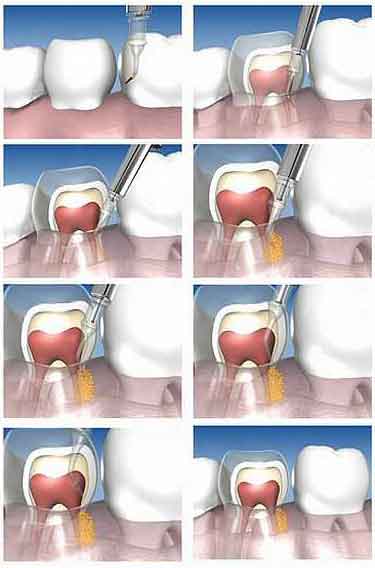Gum Therapy

FEELING: If anesthesia was used for your gum therapy, it will begin to wear off in 30 minutes to 4 hours. Until that time, avoid all hot foods or liquids, and do not chew. This is to prevent accidentally burning or biting the lips, cheeks, or tongue until the feeling has returned.
ACTIVITY: Refrain from any unnecessary exertion. Avoid running, jogging, or any athletic activity for the first 24 hours after treatment. Excessive activity will increase blood pressure and may cause unusual bleeding. Minor bleeding or oozing is normal and will occur for the first 2 to 12 hours after treatment. When you lie down, keep your head elevated on at least 2 pillows It is advisable to place a plastic bag over your pillow and under your pillow case the night following treatment to prevent any oozing from staining your pillow.
COLD PACKS: For the first 2 to 8 hours after treatment, ice packs may be applied to the outside of the face over the surgical area. The ice pack should be held in place for 20 minutes, then removed for 10 to 20 minutes. These packs are helpful in reducing potential discomfort and swelling. A simple and inexpensive ice pack can be made by filling a zip-lock plastic bag with ice and water.
RINSES: All rinses prescribed prior to treatment should be continued, unless instructed otherwise. In addition, warm salt water rinses (1/2 to I tsp. salt in 8oz. glass warm water) can be swished vigorously every 10 to 20 minutes for the first 2 to 6 hours. (Do not use if you are on a salt-restricted diet. )
MEDICATIONS: In most instances, an over-the-counter pain medication will provide excellent relief from any discomfort. If bleeding is not a problem, anti-inflammatory medications, such as aspirin and ibuprofen, are wonderful for reducing post-treatment soreness, otherwise, a non-aspirin medication (Tylenol) should be used as directed. If the need for a stronger pain medication or an antibiotic is anticipated, prescriptions for these medications will be provided
DIET: It is important to maintain good nutrition during the healing phase. If there are no restrictions on what you may eat, but if you are more comfortable with a liquid or soft diet for the first 24 hours, liquid meal substitutes such as ENSURE, SEGO, NUTRAMENT and INSTANT BREAKFAST are excellent replacements. It is important to drink plenty of liquids during the first day or two after treatment.
ORAL HYGIENE: Clean your teeth and gums as usual. Try not to avoid the sore areas; the cleaner you keep the affected areas, the faster they will heal. DO NOT SMOKE for the first 24 hours after treatment.
QUESTIONS / COMPLICATIONS: The following are complications commonly seen following root planning/scaling/curettage therapy.
Excessive bleeding may occur, especially if aspirin or aspirin-containing compounds have been taken within 72 hours of the treatment visit. This problem is usually self-limiting, and normally requires applying pressure (with gauze, small facial towel, etc. ) to the bleeding site. Firm pressure should be applied for 5 minutes and re-evaluated. If there is still bleeding, repeat the process until bleeding stops. In severe cases, it may be necessary to re-evaluate the bleeding at the office. Treatment may require additional external pressure, or various medications to control the bleeding.
Nausea or vomiting is common after periodontal treatment due to the ingestion or swallowing of blood. This may be compounded by the nausea-producing qualities of some of the antibiotics or pain medications prescribed. If the vomiting is profound, the medications may be discontinued or additional oral medications or suppositories may be prescribed to control this problem.
There are a variety of complications that can arise after any oral surgical procedure. These problems are usually easily controlled, but may sometimes require additional therapy. If you experience any swelling, bleeding, pain, etc., that concerns or frightens you, please contact us. We're here for you!










